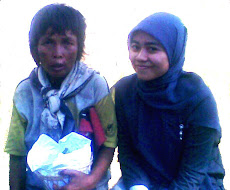Sunday, December 20, 2009
Nursing process of clients with loss and grief
The meaning of loss is subjective, as is the process of responding to a loss. The more significant the loss, the more intense the reaction we experience.
Grief is a painful experience with lifelong consequence and response to real or perceived loss. Although grief is most often associated with the death of loved one or een the loss of treasured pet, it can also occur as a result of other types of losses.
The Nursing Process
1. Assessment
Assessment of clients in the grieving process includes an accurate perception of the loss, be it a person or a relationship or a change in health status, roles in life, or dreams and aspirations for the future. Seek to understand the nature of the attachment to the lost person, object, or expectation. Asses past experience with loss and the impact those have on the present experience. Asses’ cultural rituals and rules about grieving to understand the unique experience of grieving individuals.
2. Diagnosis
Possible nursing diagnosis for survivors of a family member who has died include anticipatory grieving, dysfunctional grieving, social isolation, altered role performance, risk for altered parenting, ineffective family coping, and family coping : potential for growth.
Diagnosis may occur in clients with loss/grief:
• Altered family process
• Risk for caregiver role strain
• self esteem disturbance
• impaired social interaction
• Health seeking behavior
• spiritual distress
• social isolation or hopelessness
3. Interventions
Assisting individuals and families to progress through the grief process is in important nursing intervention. Encourage people is an important nursing intervention. Encourage people to express their feelings about the loss and help them identify their greatest fears concerning the loss. Help them recognize that all these feelings are normal part of grieving. Discuss the active process of grieving as they meet new challenges in coping. Let them know that we understand grieving takes a great deal of time and energy.
As new skills are identified and implemented, support those which are most effective. If appropriate, suggest alternative ways of dealing with challenges while supporting them in following their own choices. An Important aspect of grieving is establishing autonomy and direction in their own lives.
Discuss potentially difficult times such as holiday seasons or anniversary dates. Role playing may be helpful as they anticipates these painful events. Assist survivors to identify goals that are unattainable because of the loss while encouraging realistic goal setting. Explore the ways in which social support systems have changed as the results of the loss or death. Refer to appropriate self-help groups for survivor of death, families or mentally ill persons, and individuals who are psychiatric disabled.
Spiritual care includes helping grieving persons to seek new meaning in both life and death. Encourage them to implement religious beliefs and rituals surrounding death. Guide them through process of self-reflection as they think about what was happened to them. As grieving progress, you can provide a listening ear while they recover old and discover new goals and purposes in life.
If children are involved in the grieving process, answer their questions associated with the loss. Use clear words, such as dead or died, than euphemisms, such as passing on or gone to sleep. Clear up any misunderstanding the children may have. Use play, art, or journal therapy to help children identify and work through their feelings. Refer to community resources designed to help children cope with the loss of family member.
4. Evaluation
Some nurses have difficulty dealing with loss and death since they view the essence of caring as supporting life process. To accept death as a process of life enables other nurses to support people through this final stage of growth. To be effective caregivers, nurses must be willing to talk openly about death as well as accept their own mortality. As hoff states: “A healthy attitude toward our own death is our most powerful asset in assisting the dying through this final life passage and comforting their survivors.
Thursday, October 8, 2009
procrastination sanes??
Huummm….tiba-tiba teringat pas waktu acara PMB kmaren, waktu lomba debat tuh!! Temanya Procrastination, are u?
Heuheu, nuni ditunjuk jadi kompor soalnyah(bukan kompor gas apalagi kompor minyak, tapi yang jadi ngomporin salah satu kubu biar suasana panasss). Waktu denger pertama kali mah, kepikiran pengen mihak kubu kontra, eh ternyata nasib membawaku untuk berdiri di kubu pro procrastination…yah jadilah aku memutar otak mencari rasionalisasi procrastination…
Dan hey, ternyata procrastination bukanlah sebuah perbuatan jelek apalagi bejat! (lebay, hahaha)…procrastination adalah perbuatan menunda pekerjaan. Karena sebagai mahasiswa, tentunya nuni berpikir idealis dwonk, klw menunda pekerjaan adalah perbuatan tidak terpuji tentu sajah. Yup! Do you think so?
Tapi pada kenyataannya, procrastination (tanpa melihat sabab musabab) telah menjadi sebuah kebiasaan yang bahkan tidak kita sadari. Menunda pekerjaan, tentu saja dalam konteks ini berbeda dengan tidak mengerjakan, tapi mungkin masih satu sodara sama melalaikan tugas kali yah, hehehe….
Yah, logika sih menolak perbuatan procrastination, namun alam bawah sadar membenarkan hal ituh. Yup, procrastination terkadang dibutuhkan pada saat datang berbagai pekerjaan dalam waktu bersamaan. So, procrastination adalah mengenai Prioritas kalo kata nuni. Menunda pekerjaan untuk mengerjakan sebuah kerjaan lain yang sifatnya lebih urgent.
Dalam dunia organisasi mahasiswa nih, procrastination menjadi sebuah pembelajaran berharga mengenai cara kita, para organisatoris, menghargai waktu. Dengan waktu yang sama 24 jam sehari, 7 hari seminggu, kita dihadapkan pada masalah yang lebih banyak untuk diselesaikan dibanding dengan teman-teman lain yang hanya punya beban tanggung jawab orang tua sajah (kuliah doank .red). Bagaimana membagi waktu agar sehari dapat sepenuhnya berguna dan dapat semua pekerjaan terselesaikan, bagaimana menyusun skala prioritas, bagimana untuk menghargai waktu yang tersedia…
Selain mengenai skala prioritas, procrastination juga adalah tentang refresh. Yah, jadi terkadang kita perlu untuk menunda pekerjaan ketika otak kita lagi ngebul2nyah, hati lagi bête-betenyah, dan duit lagi cekak-cekaknyah (loh, yang ini kykny g nyambung dweh). Yup, karena pekerjaan yang dikerjakan ketika pikiran sudah tidak focus dan mood sudah hilang akan menjadi tidak maksimal alias asal-asalan…
So, take a breath and relax…
Biarkan semua tertunda dahulu dan mulailah kembali dengan pikiran sejernih mata air dan hati secerah mentari pagi (halah..)
Dan ternyata semua orang mempunyai kecendrungan unyuk menjadi procrastinator. Namun apakah kita seorang procrastinator kronis???!!! yup, procrastinator kronis tidak lagi tentang menyusun skala prioritas, tapi MALES, alias hoream… nunda pekerjaan dengan alesan nunggu mood muncul, wuuuiiihhh….repot, karena ternyata procrastinator kronis dapat berdampak pada tidak terselesaikannya pekerjaan!
Nah, how do you think ‘bout this??


